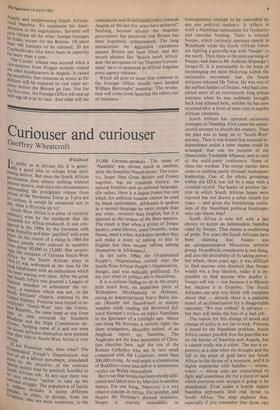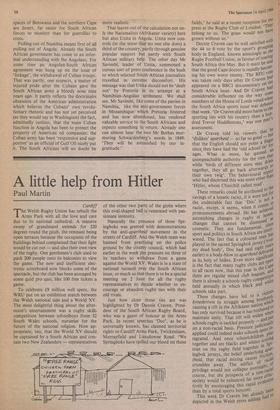Curiouser and curiouser
Geoffrey Wheatcroft
Windhoek In public as in private life it is gener- , ally a good idea to refrain from atm- "ting motive. But since the South African 8°, vernrnent does almost nothing without ulterior motive, and since the circumstances surrounding the precipitate release from Proison of Mr Hermann Toiva ja Toiva are s curious, it would be unnatural not to ask, what is Pretoria up to? South-West Africa is a piece of territory Sc arbitrary even by the standards that the ramble for Africa produced. It was con- quered in the 1880s by the Germans with meat brutality and later 'pacified' with even re. In the course of a rising in 1904 the Herero People were reduced in numbers rn about 80,000 to 15,000. Not surpris- ingly the conquest of German South-West A. frica by the South African army in l,19oeal 14-15 was welcomed at the time by the has been with an enthusiasm which nas been waning ever since. After the great war South Africa was granted a League of Nations mandate to administer the ter- ritory, a mandate which was not, to the South Africans' chagrin, renewed by the united Nations. Pretoria once hoped to in- corporate 'South-West' into the Union, time Republic, the same hope as was from R to time nurtured for Southern ihodesia and the High Commission ter- triht°ries. Nothing came of it and not even tron ea South Africans themselves now pretend t their title to South-West Africa is very sg. If not Pretorian rule, then what? The `-'d'atuboland People's Organisation was ii.Lrit'st of r " a labour movement, stimulated lab" bY the iniquities of the contract s our sYstem than by patriotic hostility to n°0uth African rule. In any case there was .very obvious 'nation' to take up the 4tional struggle. The population of barely Million includes a dozen different P,e va_°Ples, or tribes, or groups, from the 'rribos, who are most numerous, to the 35,000 German-speakers. The name of 'Namibia' was chosen much at random, after the beautiful Namib desert. The coun- try, larger than Great Britain and France together, has no common history, no natural frontiers and no national language. (Or rather, there is a lingua franca but one which for political reasons cannot be used by black nationalists. Afrikaans is spoken as a second language by more people than any other, certainly than English, but it is damned as the tongue of the Boer masters. The result is that when a group of Swapo leaders, some Herero, some Ovambo, some Nama, meet a white Afrikaans-speaker they will make a point of talking to him in English but then resume talking among themselves in Afrikaans.)
In the early 1960s the Ovamboland People's Organisation turned into the South-West African People's Organisation, Swapo, and was radically politicised. To say just what its politics are is hazardous.
It is a curious feeling to sit in the pretty little hotel here, an expatriate piece of Wilhelmine Mecklenberg or Holstein, eating an inappropriately heavy Baltic din- ner (Kassler mit Sauerkraut) in steamy weather while reading the Reverend Ed- ward Norman's review on topics Namibian in the Spectator of a fortnight ago. About one thing Mr Norman is entirely right: the sheer strangeness, absurdity indeed, of an Anglican report on Namibia. The Anglicans are the least important of Chris- tian churches here, half the size of the Roman Catholics who are in turn small compared with the Lutherans, more than 300,000 strong. As well might a commission of Buddhists come and deliver a sententious verdict on Welsh nationalism.
But to say that Swapo has been wholly infil- trated and taken over by Marxists is another matter. For one thing, 'Marxism' is a very relative concept in Africa. For another, and despite Mr Norman's decanal strictures, Swapo is scarcely monolithic or homogeneous enough to be controlled by any one political tendency. It reflects in itself a Namibian enthusiasm for fissiparity and intestine feuding. There is internal Swapo, which curiously operates openly in Windhoek while the South African forces are fighting a guerrilla war with `Swapo' to the north. Then there is the external wing of Swapo; and there is Mr Andreas Shipanga's Swapo-D. It is presumably in the hope of encouraging yet more bickering within the nationalist movement that the South Africans released Mr Toiva. He was one of the earliest leaders of Swapo, who had com- pleted most of an enormously long prison sentence when he was suddenly brought back and released here, whither he has now returned after a form of state visit to nearby African countries.
South African has operated successive strategies in Namibia. First came the unsuc- cessful attempt to absorb the country. Then the plan was to hang on to 'South-West' anyway. Then it was hoped that nominal in- dependence under a tame regime could be arranged: that was the purpose of the Democratic Turnhalle Alliance, and in turn of the multi-party conference. None of these has worked. The stooge parties have come to nothing partly through inadequate leadership. One of the ethnic groupings within the DTA was led by a man with a criminal record. The leader of another fac- tion in which South African hopes were reposed has not drawn a sober breath for years — and given the bewildering confu- sion of the Namibian political landscape, who can blame him?
South Africa is now left with a last choice: to accept an independent Namibia ruled by Swapo. That means a swallowing of pride. For years the South Africans have been claiming that Swapo was an unrepresentative Muscovite terrorist group. Its political complexion is one thing, and also the desirability of its taking power; but where, three years ago, it was difficult to find anyone who doubted that Swapo would win a free election, today it is im- possible to find anyone who doubts it. Swapo will win — not because it is Marxist but because it is Ovambo. The South Africans can and very likely will complain about that — already there is a palpable mood of acclimatisation for a disagreeable outcome: 'We wuz robbed' in advance but they will make the best of a bad job.
The reason for this change of mood and change of policy is not far to seek: Pretoria is bored by the Namibian problem. South Africa cannot possibly lose the guerrilla war on the border of Namibia and Angola, but it cannot really win it either. The war is ex- pensive, at a time when the drought and the fall in the price of gold have put South Africa in the throes of a recession, and it is highly unpopular with families — whites, voters — whose sons are conscripted to fight and sometimes die for a piece of land which everyone now accepts is going to be abandoned. Even under a hostile regime Namibia represents little real threat to South Africa. The map explains that, especially if you remember that those vast spaces of Botswana and the northern Cape are desert, far easier for South African forces to monitor than for guerrillas to cross.
Pulling out of Namibia means first of all pulling out of Angola. Already the South African government has come to an infor- mal understanding with the Angolans. For some time an Angolan-South African agreement was hung up on the issue of 'linkage', the withdrawal of Cuban troops. That was partly, one suspects, a matter of injured pride after the Cubans gave the South African army a bloody nose nine years ago. It partly reflects the doctrinaire obsession of the American administration which believes the Cubans' own revolu- tionary rhetoric and has not yet perceived (as they would say in Washington) the fact, admittedly curious, that the main Cuban function in Angola has been to protect the property of American oil companies: the Cuban army has been 'responsive and sup- portive' as an official of Gulf Oil nicely put it. The South Africans will no doubt be more realistic.
That leaves out of the calculation not on- ly the Nationalists (Afrikaner variety) here but also Unita in Angola. Unita now con- trols (in the sense that no one else does) a third of the country, partly through genuine popular support but partly with South African military help. The other day Mr Savimbi, leader of Unita, summoned a curous sort of press conference in the bush to which selected South African journalists travelled in extreme discomfort. His message was that Unita should not be 'dealt out' by Pretoria in its attempt at a Namibian-Angolan settlement. We shall see. Mr Savimbi, like some of the parties in Namibia, like the anti-government forces in Mozambique which Pretoria fostered and has now abandoned, has rendered valuable service to the South Africans and expects something in return. Already one can almost hear the two Mr Bothas mur- muring Schwarzenberg's words in 1849: 'They will be astonished by our in- gratitude.'











































 Previous page
Previous page